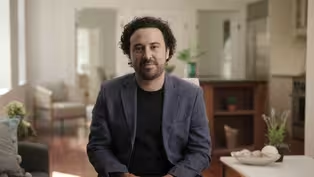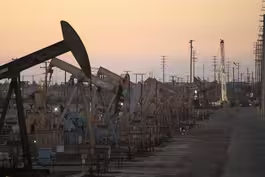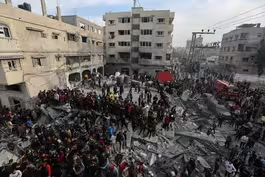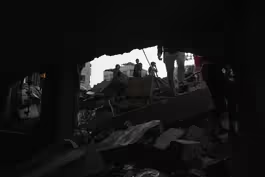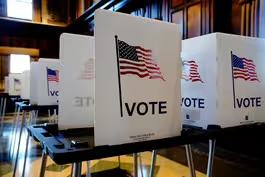
The war over fake content linked to Israel-Hamas conflict
Clip: 12/28/2023 | 8m 22sVideo has Closed Captions
The online information war over fake content linked to Israel-Hamas conflict
The Israel-Hamas war is nearing its third month in Gaza, but there is another front in this war and it’s taking place on screens worldwide. Fake or mislabeled content linked to the conflict has been viewed online millions of times. Amna Nawaz discussed the disinformation war with Shayan Sardarizadeh and Valerie Wirtschafter.
Problems playing video? | Closed Captioning Feedback
Problems playing video? | Closed Captioning Feedback
Major corporate funding for the PBS News Hour is provided by BDO, BNSF, Consumer Cellular, American Cruise Lines, and Raymond James. Funding for the PBS NewsHour Weekend is provided by...

The war over fake content linked to Israel-Hamas conflict
Clip: 12/28/2023 | 8m 22sVideo has Closed Captions
The Israel-Hamas war is nearing its third month in Gaza, but there is another front in this war and it’s taking place on screens worldwide. Fake or mislabeled content linked to the conflict has been viewed online millions of times. Amna Nawaz discussed the disinformation war with Shayan Sardarizadeh and Valerie Wirtschafter.
Problems playing video? | Closed Captioning Feedback
How to Watch PBS News Hour
PBS News Hour is available to stream on pbs.org and the free PBS App, available on iPhone, Apple TV, Android TV, Android smartphones, Amazon Fire TV, Amazon Fire Tablet, Roku, Samsung Smart TV, and Vizio.
Providing Support for PBS.org
Learn Moreabout PBS online sponsorshipGaza's telecommunications company once# again announced a commun But there is another front in this war, and# it's taking place on our screens worldwide.## Fake or mislabeled content linked to the war# has been viewed online millions of times.
To explore this issue, Amna spoke# earlier with Shayan Sardarizadeh,## a senior journalist with BBC monitoring's# disinformation team, and Valerie Wirtschafter,## a fellow studying technology and foreign# policy at the Brookings Institution.
AMNA NAWAZ: Thank you to you both for# joining us.
We really appreciate it.
Valerie, I want to start with you.
You have looked at misinf conflicts too.
What is different about this# work when it comes to this specific con VALERIE WIRTSCHAFTER, Brookings Institution:# I think what's different here is that this is## really, I think, an emotionally resonant con of this confirmation bias, this ability to# kind of just discount confirming evidence.
All of those things, I think,# are really in play here.
AMNA NAWAZ: And the reach, Valerie,## just to follow u Video that claimed to be Israeli forces shooting# at Israelis at the music festival on Oc that was seen 30 million times.# There was the fake claims about## a 5-month-old Palestinian baby who was# killed in an airstrike that people were## claiming was a doll.
That went viral.# It was published in the Israeli press.
I mean, does the global interest in# this war mean that that misinformation,## disinformation gets spread even faster?
VALERIE WIRTSCHAFTER: I think shocking# things The boring stuff, the truth when we can get to# the bottom of things, that's far less resonant,## I think.
And so when there are kind of claims# being logged back and forth, they get amplified.
AMNA NAWAZ: Shayan, you have the near-impossible# job of trying to verify some of these videos,## to debunk the disinformation that's# out there and verify what you can.
We have seen in this war too just images# from other places, images from Syria,## for example, being passed off# as something that was unfolding## in Gaza.
How do you even begin to# verify what's real and what's SH AYAN SARDARIZADEH, BBC Verify: It's not an# easy task because of the volume of content that## is being posted and has been posted since# this conflict be And, obviously, the nature of this# conflict is a little bit different to,## say, the conflict that we're seeing in# Ukraine or, before that, the conflict in## Syria.
This is a conflict that's been going on# for decades and decades and decades and decades.
People have already sort of jumped into# this with sort of their minds completely## made up.
And, already, they assume# that they're in an information war## and they have to win it at any cost,# at any cost, even if it means denying## that a 5-month-old Palestinian baby was# actually a real baby, and not a doll,## and his mother, who was just showing that baby# to photographers in grief, was not faking it.
Or that a 16-year-old Israeli teenager# whose parents were killed in front of## him in a kibbutz near the border with Gaza on# the 7th of October is not a crisis actor and## is not basically holding his laughter# in front of cameras as he's giving an## interview recounting how he saw his parents get# killed in their house in front of his own e AMNA NAWAZ: Valerie, how does the origin of some# of this disinformation matter in this conflict?
I'm thinking specifically of a video# I know was widely covered.
The Israel## Defense Forces shared a list that was# posted in a basement of a Gaza hospital.## They said it was a list of Hamas members, a# schedule for them guarding Israeli hostages.## It was actually a calendar in which the# days of the week were listed in Arabic.
But that video was reported on widely# by a number of other news organizations.## It's coming through official channels.
How does# that change the nature of this information war?
VALERIE WIRTSCHAFTER: I think it creates# sort of just an immediate ability to## distrust any purveyor of information# who is in the region, on the gr Potentially, given the destruction# and the violence in this conflict,## there are so few people that are actually on the# ground, those that are on the grou have kind of a vested interest in the information# space.
And so we can see it with the IDF and the## calendar example you mentioned trafficking# in conspiracies or misleading information.
Journalists who want to get into Gaza have to# go with the IDF.
That's maybe innocuous.
Maybe## it's just to review footage to make sure that# identities aren't revealed or things like that,## but it's immediately sort of ability to dismiss,## given past -- whether it's massaging the# truth, completely fabricating or sort of seeding alternative narratives,# it's immediately disqualifying as well.
On the other side of the coin,# of course, Hamas, I think,## has long looked unfavorably on journalists.# Why -- from the Israeli perspective or from## those who sort of are sympathetic with# the Israeli cause, why believe them now?
And so I think that that's# a really huge challenge.
AMNA NAWAZ: Valerie, what's the# real-world impact of thi of disinformation spreading as# widely and as quickly as it does?
VALERIE WIRTSCHAFTER: Maybe an example# is the best way to answer that question,## is, looking at the kind of aftermath and# ambiguity around the hospital bombing of earlier in the conflict, sort of there was a# knee-jerk reaction to kind of cover this event.
All the information wasn't known.
Mainstream media# outlets jumped on it, of course.
Protests erupted,## and then several diplomatic meetings were# canceled as a result.
In this conflict,## conversation and those types of high-level# communications are so important,## but it wasn't allowed to move forward# simply because protests and sort of the## unwillingness of governance# to engage after that event.
And the challenge, of course, with that# event is that it was very unclear what## happened.
There was not a lot of# on-the-ground reporting at all at## the time.
And then, in the aftermath,# more information was pieced together.
AMNA NAWAZ: Shayan, I have said before this war# is extremely online.
And were it not for social## media and a lot of online platforms, you have# to think about what we wouldn't see when it## comes to both the October 7 attacks and also# what's been unfolding on the ground in Gaza.
With people getting so much information and# so much content, how do you advise them on## what they should do, how they should view all of# this in sorting out what's real from what's not?
SHAYAN SARDARIZADEH: Well, it# is not easy.
It's not an easy## question for me.
It's not an# easy question for journalists,## never mind the ordinary member of the public who# It's important to just, first of all,# to be careful about the source.
Who's## saying this?
How biased are they?
What type of# narrative are they pushing?
Just hav at their profile online.
Again, they might# have hundreds of thousands of followers,## millions of followers, but are they actually# pushing a certain narrative, a certain agen Or are they somebody who's genuinely or# an outlet who's genuinely trying to tell## the story of the conflict without putting# any personal bias into it?
See whether this## video that has got 10 million views, has it# been reported anywhere else?
Has any of the## journalists who are either in Israel or# in Gaza mentioned this, referred to it?
Try and follow people, actual journalists who# are on the ground or actual people, witnesses,## eyewitnesses who have reliably posted videos# from what's happening on the ground on several## occasions before this particular video.
So,# if you see something that is incredibly viral,## that doesn't necessarily mean it's true.
It# also doesn't necessarily mean it's false.
It just means, with a conflict like# this, we all have to be careful.
If## you're not 100 percent, the best# thing to do is just not share it.
AMNA NAWAZ: I'm so grateful to both of you for the# work you do to make sure the facts get ou Shayan Sardarizadeh and Valerie Wirtschafter,# thank you so much for your time.
A Brief But Spectacular take on music empowering communities
Video has Closed Captions
Clip: 12/28/2023 | 3m 15s | A Brief But Spectacular take on how music empowers communities (3m 15s)
How U.S. oil production reached an all-time high in 2023
Video has Closed Captions
Clip: 12/28/2023 | 7m 14s | How U.S. oil production reached an all-time high in 2023 (7m 14s)
Israel and Hezbollah fight raises fears of a wider war
Video has Closed Captions
Clip: 12/28/2023 | 6m | Escalating tensions between Israel and Hezbollah grow fears of wider outbreak of war (6m)
Israeli bombardment of Gaza cities and camps kills dozens
Video has Closed Captions
Clip: 12/28/2023 | 3m 27s | Israeli bombardment of Gaza cities and refugee camps continues, killing dozens (3m 27s)
Physician discusses demand for weight-loss drugs and risks
Video has Closed Captions
Clip: 12/28/2023 | 7m 59s | Physician discusses surge in demand for weight-loss drugs and risks in using them (7m 59s)
State ballot measures could drive voter turnout in 2024
Video has Closed Captions
Clip: 12/28/2023 | 4m 35s | State ballot measures in 2024 could drive voter turnout and change the future of elections (4m 35s)
Trump's criminal and civil cases could shape the campaign
Video has Closed Captions
Clip: 12/28/2023 | 5m 45s | How Trump's criminal and civil cases could shape the 2024 campaign (5m 45s)
Providing Support for PBS.org
Learn Moreabout PBS online sponsorship
- News and Public Affairs

FRONTLINE is investigative journalism that questions, explains and changes our world.

- News and Public Affairs

Amanpour and Company features conversations with leaders and decision makers.












Support for PBS provided by:
Major corporate funding for the PBS News Hour is provided by BDO, BNSF, Consumer Cellular, American Cruise Lines, and Raymond James. Funding for the PBS NewsHour Weekend is provided by...
